This is a review of the best mouthwash, whether you have gum disease, tonsil stones, or want fresher breath.
We combed through myriad brands, looking closely at ingredients and dentist recommendations.
In this article, we’ll talk about:
- Best mouthwash for tonsil stones
- Alkaline mouthwashes
- Ingredients to look out for or avoid
- Recipes for natural homemade mouth rinses
- How to use mouthwash correctly (and whether you really need to use it at all)
We hope this information helps you make the right choices for your oral hygiene needs.
If you just want a quick answer about the best mouth rinse for a certain purpose, the table below has our recommendations. You can read about all these and more in the rest of the article.
| Image | Name | Best for | Active ingredient | Price |
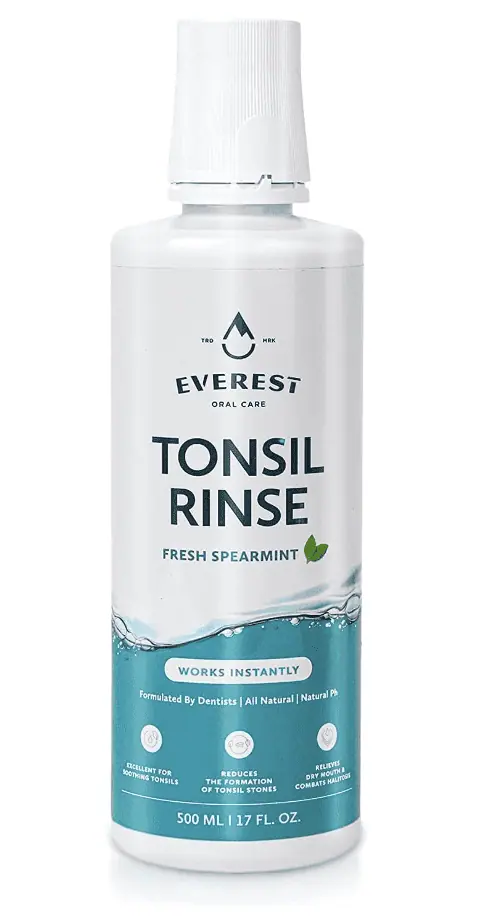  | Everest Tonsil Rinse | Tonsil stones | Aloe | |
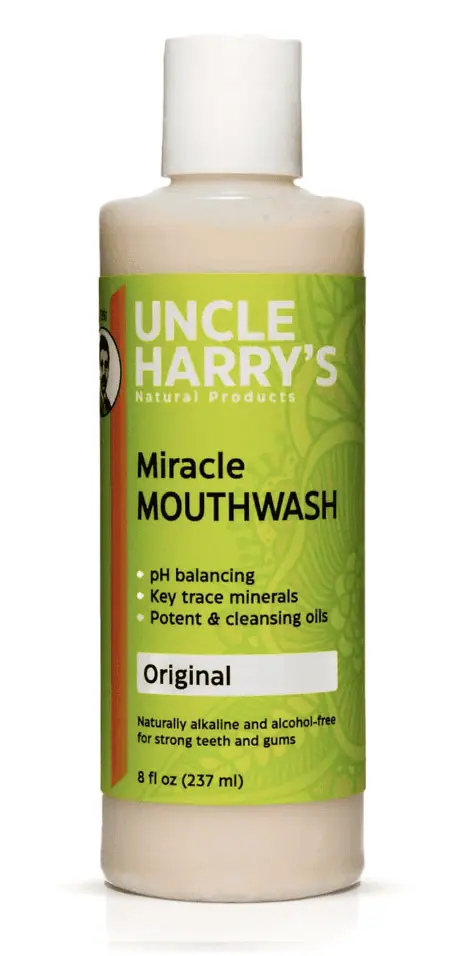  | Uncle Harry’s Miracle Mouthwash | Alkalizing | Calcium, magnesium, phosphorus | |
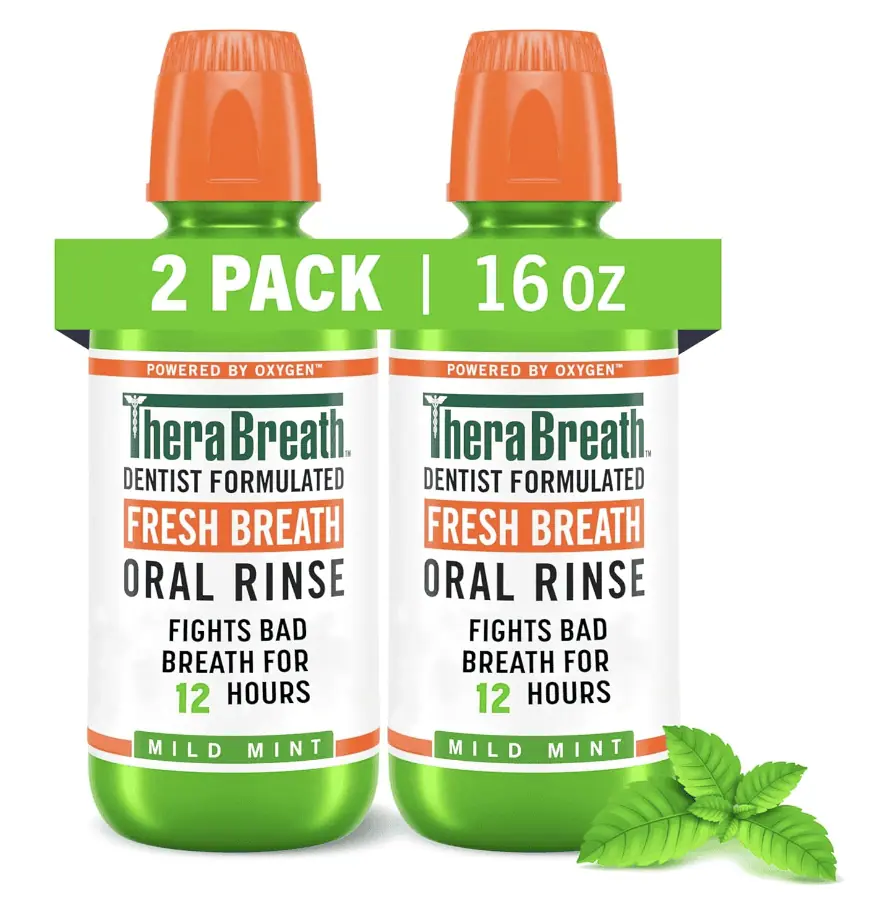  | TheraBreath Fresh Breath | Stronger bad breath protection | Chlorine dioxide | |
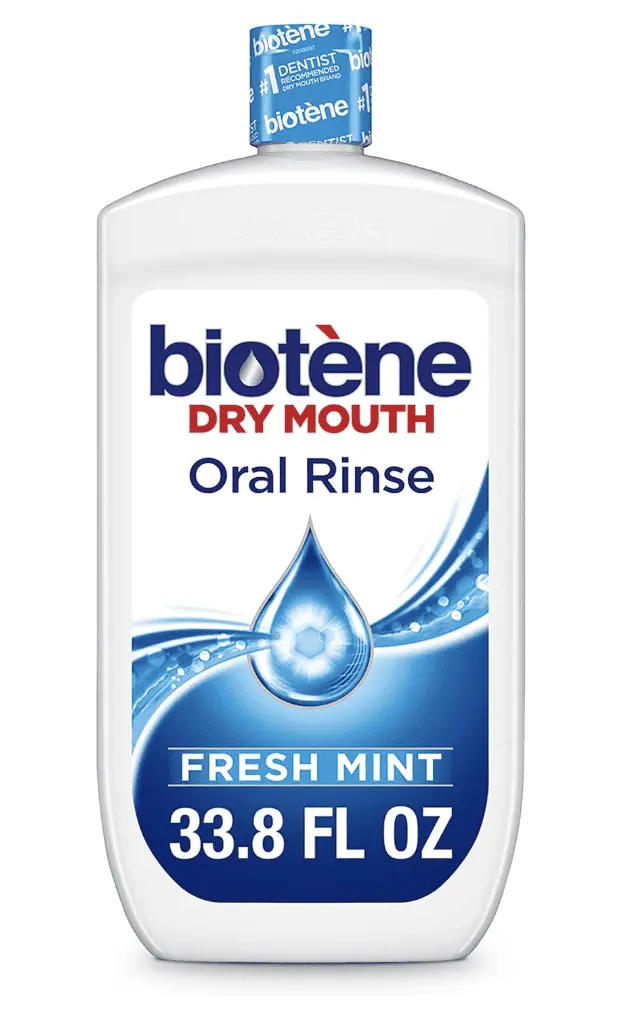  | Biotene Dry Mouth Oral Rinse | Dry mouth | Cetylpyridinum chloride | |
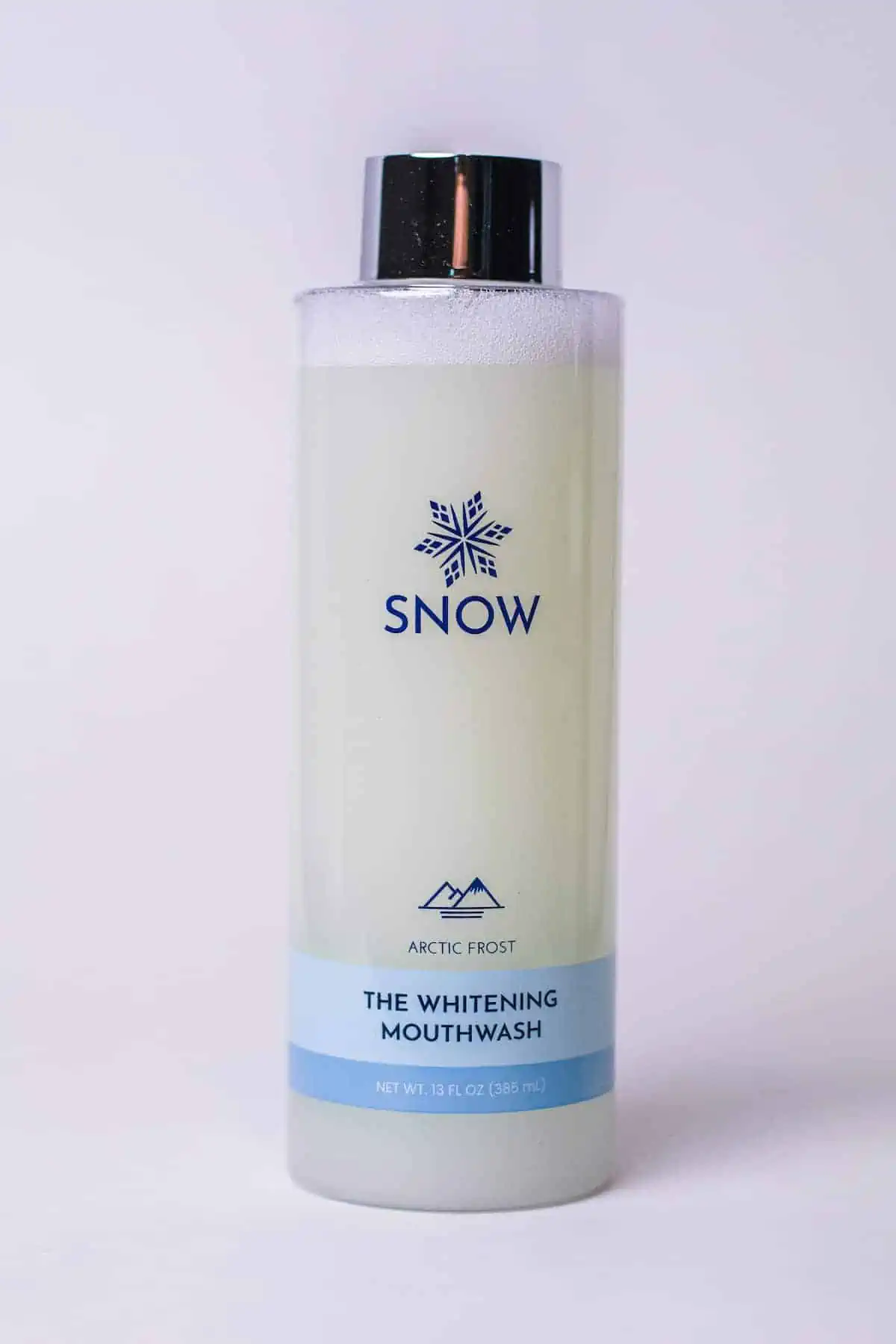  | Snow Teeth Whitening Mouthwash | Whitening | Hydrogen peroxide | |
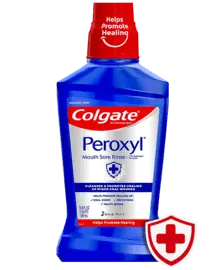  | Colgate Peroxyl Mouth Sore Rinse | Canker sores | Hydrogen peroxide | |
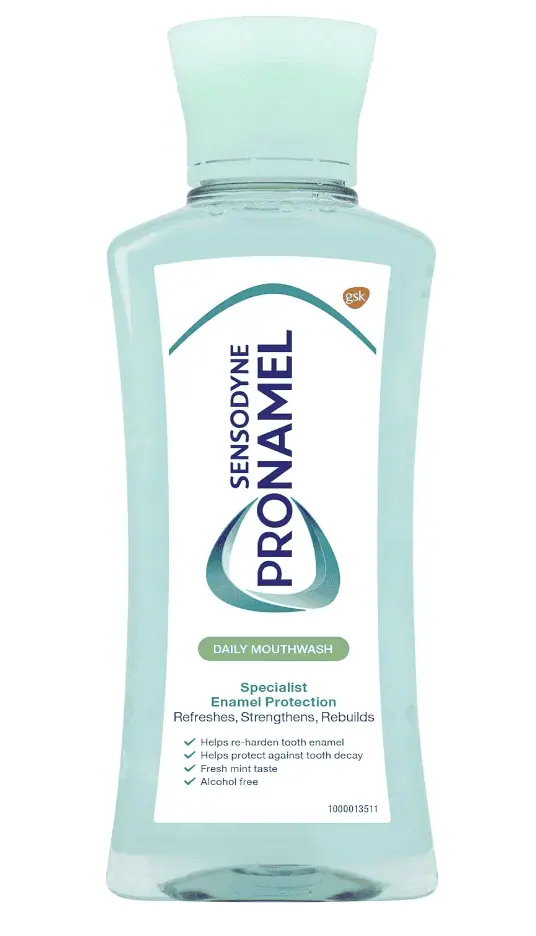  | Sensodyne Pronamel | Sensitive teeth | Fluoride | |
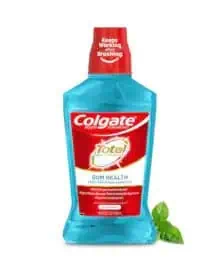  | Colgate Total Gum Health Alcohol Free | Alcohol-free | Cetylpyridinum chloride |
Best mouthwashes
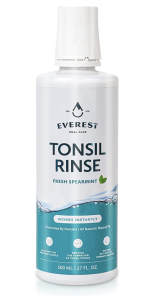

Best mouthwash for tonsil stones: Everest Tonsil Rinse
Everest Tonsil Rinse uses natural ingredients like aloe, marigold extract, goldenseal root, licorice root extract and chamomile, and spearmint oil to stop tonsil stones from forming.
This natural tonsil stone mouthwash also freshens breath, soothes discomfort caused by tonsil stones, and relieves dry mouth.
This mouthwash is free from chemicals and harmful additives, including alcohol, parabens, and sodium lauryl sulfates, which are used in many oral health products and can cause canker sores.
Best alkaline mouthwash: Uncle Harry’s Miracle Mouthwash
Many types of mouthwash are acidic, meaning that while they are effective in killing off bacteria, they create an environment in your mouth that encourages the bacteria to grow back even faster.
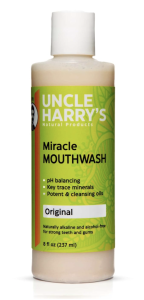

An alkaline mouthwash is a mouthwash with a pH that isn’t acidic and therefore doesn’t encourage the regrowth of bad bacteria after it is killed by the mouthwash.
Try Uncle Harry’s Miracle Mouthwash — it balances the pH levels in your mouth by eliminating the microbes that cause dry mouth and bad breath.
A winning combination of calcium, magnesium, and phosphorous work to remineralize teeth, and neutralize bacteria, while mustard seed strengthens gums, eucalyptus cleanses, and essential oils fight cavities and freshen breath.
Best mouthwash for bad breath: TheraBreath
TheraBreath makes a wide range of mouthwashes that come highly rated by people who haven’t had great results with mainstream brands. Among these, their most popular option (and our top recommendation) is TheraBreath Fresh Breath.
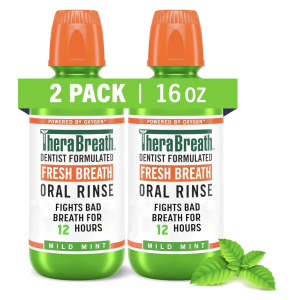

An antibacterial mouthwash can help combat bad breath by killing the plaque bacteria which cause bad smells in the mouth. Also look for a mouthwash without alcohol, since this can dry the mouth out and make it smell worse in the long run.
The best way to get rid of bad breath is by brushing your teeth properly twice a day and cleaning between teeth daily with floss or an interdental brush. Using a tongue scraper can also make a big difference to your breath.
If you are already doing this and you still have persistent bad breath, it may have another underlying cause like gum disease, cavities, or some other medical problem. In this case, you may want to see a dentist.
Best rinse for dry mouth: Biotene
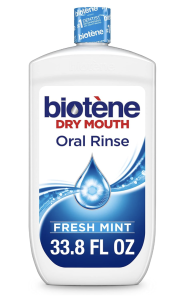

Dry mouth occurs when you don’t produce enough saliva. This makes it easier for bacteria to build up, causing bad breath. Always use an alcohol-free mouthwash for dry mouth, since alcohol can dry the mouth out further.
Biotène Dry Mouth Oral Rinse has a special formula that immediately moisturizes the mouth for up to four hours. It can be used up to five times a day.
Biotène mouthwash does cost more than most standard oral rinses, but most people find it makes a big difference to their symptoms.
One reviewer who suffers from chronic dry mouth says about this rinse:
“Keeps my mouth well moisturised and lasts for a good few hours. The taste is pleasant which helps too.”
Biotène is also available as a spray, which is more convenient to use throughout the day.
Best whitening mouthwash: Snow
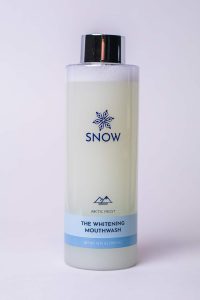

Many brands include a teeth-whitening mouth rinse in their range containing hydrogen peroxide or another whitening agent. The concentration of these agents in teeth-whitening mouthwash is generally quite low and on its own, the effects are minimal.
If you want to noticeably whiten your teeth, we would recommend that you use a whitening mouthwash in addition to other whitening methods, like using a whitening toothpaste or possibly even home whitening kits.
But if you’re just looking to compliment your teeth-whitening routine, you may want to try the whitening mouthwash by Snow. It has hydrogen peroxide for teeth whitening and aloe to soothe your gums. It’s also SLS, paraben, and alcohol-free. There are two flavors — arctic mint and strawberry mojito.
Best mouthwash for canker sores: Colgate Peroxyl
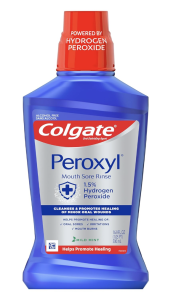

If you are prone to canker sores, then you are definitely looking for an antiseptic mouthwash that will help your mouth feel better, and fast.
Colgate Peroxyl Mouth Sore Rinse cleanses and helps heal minor oral wounds including canker sores, irritation and burns. This debriding agent uses oxygenating action to remove oral debris, while 1.5% hydrogen peroxide leaves wounds clean.
One happy customer says:
“My canker sores were healing within a day of using it, and they were gone in just about 3. This is my new go-to for flare-ups.”
It can also help soothe gum inflammation due to dental procedures and wounds caused by braces or retainers. Some people have success using it for tonsil stones as well, which in turn leads to much fresher breath.
Best fluoride mouthwash for sensitive teeth: Sensodyne
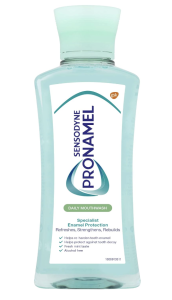

Sensodyne Pronamel Mouthwash is one of the best fluoride mouth rinses for sensitivity, as it has one of the highest fluoride concentrations around, at 450ppm–that’s double all the other fluoride mouthwashes featured here.
It’s designed to protect teeth from acids we consume every day in things like fruit, soda and wine. The taste of this Sensodyne mouthwash is not overbearing and it’s a good supplement to their sensitive toothpaste range.
If you suffer from sensitivity, consider using one of these sensitive toothpastes in our guide here as well.
Best kids’ mouthwash
Can you use mouthwash for kids? Some brands, including Listerine and ACT mouthwash, make special children’s mouth rinse with a child-friendly taste and fluoride to prevent cavities.
Although not an essential part of a child’s oral hygiene routine, your dentist might recommend using one for extra enamel protection.
Many ‘adult’ daily use mouthwashes are also fine for children aged 6+, provided they don’t contain alcohol, but children shouldn’t use stronger, medicated rinses.
It’s important that children don’t swallow mouthwash, so make sure they are supervised until you’re confident they will spit it out every time.
Best Alcohol-free mouthwash
Many types of antiseptic mouthwash contain ethanol, a type of alcohol, which helps fight the plaque bacteria that cause tooth decay and bad breath. Ethanol also helps other ingredients blend together and acts as a preservative.
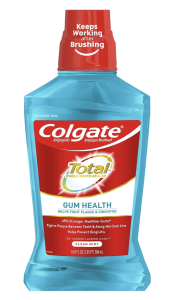

The alcohol content can be quite high, ranging from around 14% to 26% in different brands.
Swishing a capful around your mouth won’t get you tipsy, but there are a number of reasons why you might want to avoid a mouthwash that contains alcohol:
- Children will be using it
- There are older children or recovering alcoholics in the household who might be tempted to deliberately ingest it
- You don’t like the strong taste
- It causes a burning sensation or sensitivity in the mouth
- You find it makes your mouth dry
- You’re worried about the possible links with oral cancer
You may also want to try Colgate’s Total Gum Health Alcohol-Free mouthwash, which contains CPC (cetylpyridinium chloride) as an alternative ingredient to fight plaque.
Other types of mouthwash and alternatives
Natural Mouthwashes
Oral rinses with natural ingredients are becoming more popular as consumers are beginning to worry more about the possible negative effects that could be caused by key ingredients and chemicals used in popular oral rinses.
So what’s the best natural mouthwash? Well, as you might suspect, it depends on what you are looking for in a mouth rinse. Some natural mouthwash is for periodontal disease, some are for remineralizing enamel. Some mouthwash is non-alcoholic, other types are fluoride-free or vegan.
If you like to know exactly what you’re putting in your mouth, we have a separate article dedicated to making your own mouthwash at home. While we’re on this topic, you might also be interested in our natural toothpaste recipes.
Prescription mouthwash
Prescription mouthwashes normally contain chlorhexidine gluconate and are not sold over the counter. The following is a list of the most common prescription mouthwashes.
- Peridex mouth rinse
- PerioChip mouth rinse
- Periogard mouth rinse
- Paroex mouth rinse
These chlorhexidine gluconate mouthwashes are not meant to treat all kinds of gum disease, and should only be used as prescribed by your dentist.
Magic mouth rinse
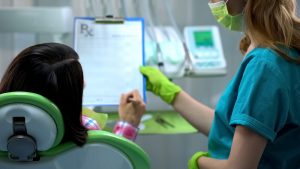

The “magic mouthwash” recipe is a special formula for people who are undergoing chemotherapy and radiation therapy for cancer. These cancer treatments can harm cells in the mouth, causing oral mucositis, with symptoms such as dry mouth, swollen gums and mouth sores.
This mouthwash is prescribed by a doctor and then mixed by a pharmacist. According to the Mayo Clinic, it contains three or more of the following ingredients:
- An antibiotic
- An antihistamine or local anesthetic
- An antifungal
- A corticosteroid
- An antacid
If you are undergoing cancer treatment, speak with your doctor about magic mouthwash. Don’t use it without a prescription as some magic mouthwash side effects can include loss of taste, a burning sensation and nausea.
Does mouthwash work, and is it necessary?
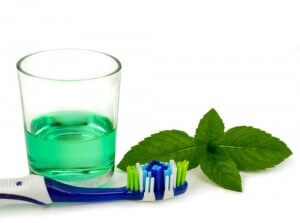

There are many different kinds of mouth rinse which contain different ingredients to target different oral health needs. Let’s look at the benefits of mouthwash for specific needs.
Benefits of mouthwash
It’s well established that oral rinses are good for freshening breath, and if you choose a fluoride mouthwash then it can help strengthen your teeth, too.
A dentist may advise you to use an antimicrobial mouthwash for gum disease, herpes on the tongue, or a special rinse for dry mouth.
So, a mouth rinse can be a helpful addition to your oral hygiene routine if you have one of these specific needs.
Research shows that around 31 percent of American adults use mouth rinse. However, many more probably should and don’t. As a patient, how do you know if you need to use it? Simple answer? Talk to your dentist.
A comprehensive dental exam can reveal if you need mouth rinse, what kind you need, and how often you should use it.
Mouth rinse is a good addition to your oral care routine but does NOT replace the regular use of brushing and flossing. It reaches in between spaces in the mouth that toothbrushes or floss can’t reach.
Always consult with a dentist before you start using mouth rinse to determine kind and frequency. Some mouthwashes have a high alcohol content and can damage your teeth enamel if not used appropriately or if used too much.
Dr. Kevin Varley, Stonebrook Family Dental
Can mouth rinse be bad for you?
There are a few drawbacks to using oral rinses that you should be aware of before deciding whether to use it regularly, including disruption of good bacteria and allergies:
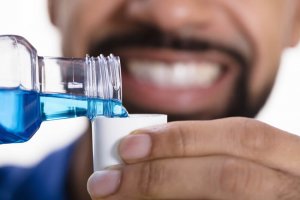

- Mouth rinse can make you think your teeth are clean when they are not. It is not a substitute for brushing twice a day and cleaning between teeth daily since it doesn’t do an effective job of removing plaque.
- It can wash away fluoride and other beneficial ingredients in your toothpaste. Wait at least 30 minutes after brushing before rinsing your mouth, otherwise, the fluoride in your toothpaste won’t be as effective.
- Regular use for bad breath may be masking a more serious problem. Halitosis (chronic bad breath) can be caused by rotting teeth, gum disease, and other medical conditions. If you’re on the keto diet, you may even have keto breath. Visit your dentist rather than trying to cover up the issue.
- Antibacterial mouthwash can disrupt the good as well as the bad bacteria in your mouth. Certain bacteria are an important part of your immune system, and you may experience side effects from wiping them out on a daily basis.
- Some people experience a reaction to certain ingredients. If it feels like your oral rinse is burning your tongue or making it sting, stop using it and try a different formula.
How to use mouthwash
So now that you know which is the best mouth rinse for your needs, let’s make sure you understand how to use it correctly.
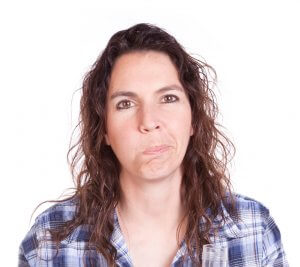

- Check the instructions on the label. With stronger, medicated mouthwash you might need to dilute the solution before use. The packet will also tell you how much to use, and how for how long.
- Measure out the correct amount. You can pour it into a glass or the bottle cap (which might have a marker to show the right amount), but don’t tip it straight into your mouth without measuring it.
- Swish vigorously. Keeping your mouth closed, swish the liquid around your mouth and between your teeth. You might choose to gargle, too. Keep going for the specified time, usually 30 or 60 seconds.
- Spit. Don’t swallow any mouth rinse, since the ingredients can be harmful if ingested in large enough quantities.
- If using a fluoride mouthwash, don’t eat or drink for 30 minutes after use. This lets the fluoride have maximum effect protecting your teeth against decay.
When to use mouth rinse
Unsure whether to use mouth rinse before or after brushing? Unless specifically directed by your dentist, the answer is unclear. That is to say, you won’t get much benefit from using mouthwash before you brush, and if you use it right after brushing it will wash away the beneficial ingredients in your toothpaste (particularly fluoride).
Even if you use a fluoride mouth rinse, the concentration is much lower than most toothpastes—around 100–250 ppm compared to 1350–1500 ppm.
So, when should you use mouthwash? It depends on who you ask. The American Dental Association says to follow the instructions on your mouthwash, or to do what you prefer, and international organizations like the NHS say to just not use it after brushing with a fluoride toothpaste.
Mouthwash may seem like an everyday product that’s safe for anyone to use, but there are some circumstances in which it is not recommended:
- For people who are allergic or hypersensitive to any of the mouthwash ingredients
- For children under six years of age, due to risk of swallowing
- Iodine-containing mouthwash should be avoided by people with hyperthyroidism or other thyroid diseases, due to possible systemic absorption of iodine.
–Renad Nahhas, Pharmacist
How often should you use mouthwash?
Again, check the label or follow your dentist’s instructions. Many mouth rinses are safe for daily use over a prolonged period of time. However, some stronger rinses are only for short-term use. Excessive mouth rinse usage may cause stains on teeth and other problems.
If you find yourself relying on oral rinse throughout the day to cover up bad breath (and it’s not from smoking, food or drink), it’s best to visit your dentist and find out if there is an underlying cause that needs to be treated.
Here’s a short video on how frequently you should use a mouth rinse:
Conclusion
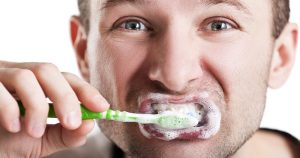

Among all of the mouthwash options on the market these days, there is no single best one. That said, there are both all-purpose and special formulas to meet your specific need.
To find the best solution for you, ask your dentist what aspects of oral health you should be focusing on, and consider your own preferences.
If your gums and enamel are healthy, maybe you will want a whitening mouthwash.
Maybe you don’t have any specific goals but want to avoid animal products, so you will want to look for a vegan natural mouthwash. In the end it depends on you.
One thing which we can say for certain is that mouthwash is not an appropriate substitute for regular brushing and flossing. Practicing proper oral hygiene is the best way to fight bad breath and gum disease. Mouthwash is meant to help in that fight, but isn’t really meant to lead it.
FAQs
What happens if you drink or swallow mouthwash?
If you accidentally swallow mouthwash while rinsing your mouth, don’t panic. Although it’s not meant to be swallowed, if you’ve ingested a small enough amount, it’s unlikely to cause any side effects.
Some people can be sensitive to ingredients like fluoride and ethanol, so it’s good to watch out for side effects which might include drowsiness, dizziness, and shortness of breath. Seek medical advice if you have any concerns, and take the mouthwash bottle or a photo of the label so the medical staff know which ingredients you might be reacting to.
There is a greater risk of children swallowing mouthwash, which is why they should always be supervised while using it. Most bottles have a child-proof safety cap, and the strong taste should put them off drinking it if they do gain access.
However, if you suspect your child has ingested more than a small mouthful of mouthwash or they are experiencing side effects, it’s best to seek medical advice.
Does mouthwash stain teeth?
Stronger formulas containing chlorhexidine are intensive treatments designed for short-term use. Use over a prolonged period has the potential for temporary teeth staining and tongue discoloration.
You can minimize the chances of staining by avoiding coffee, tea, red wine, and other foods that stain teeth easily while using chlorhexidine mouthwash. Daily brushing and flossing will also help, and any stains left after treatment ends can be removed with a professional teeth cleaning.
How much alcohol is in mouth rinse?
The alcohol content of mouthwash brands in the US ranges from around 14% to 26%. Using it as instructed and spitting it out won’t have any adverse effects, but there is the potential for abuse. Plenty of alcohol-free mouthwashes are available for people who would rather have a ‘non-alcoholic’ option.
Why does mouthwash burn or sting my mouth?
If you feel burning in your mouth after using mouthwash, you’re probably sensitive to one of the ingredients. You should try different brands to find one that causes less sensitivity.
The most likely culprits are alcohol, chlorhexidine (used in gum disease mouthwash, and available with prescription) and chlorine dioxide or other bleaching ingredients used in whitening mouthwash.
You’ll probably have to experiment with a few different brands and formulations to find one that causes less sensitivity. A natural mouthwash might be a good option, although there is no guarantee you won’t react to certain essential oils and other natural ingredients, too.
Do you use mouthwash before or after brushing?
Mouthwash is best when used at least 30 minutes after brushing, so it doesn’t wash away the effects of your toothpaste. Alternatively, you can use it between meals when you haven’t brushed your teeth.
But it should never be used as a replacement for brushing your teeth.
Can you buy chlorhexidine mouthwash over the counter in the US?
No. In the United States, chlorhexidine mouthwash must be purchased at a pharmacy with a prescription. You can buy chlorhexidine itself but it shouldn’t be used as a mouthwash.
And you shouldn’t try to use it as a mouthwash because it can have dangerous effects.
When a prescription is written for chlorhexidine, it’s usually for healing purposes or to prevent an infection after oral surgery.
Is mouthwash bad for you?
Mouthwash can be a helpful part of your daily oral hygiene routine, but when used incorrectly it can have negative effects. Before use, read the label or consult a dentist for prescription mouthwash.
Also, only used prescribed mouthwash according to your dentist’s instructions, as many aren’t meant for continued use. You should also be aware that although oral rinses make breath smell good, it could be masking a bigger problem, like bad breath caused by tooth decay or infection.
Can I use mouthwash after a tooth extraction?
For about two weeks after a tooth extraction, it is best to avoid mouthwash. However, there are some time-honored mouth rinsing techniques that are safer after an extraction. One of the most popular is rinsing your mouth with saltwater, which acts as a nautral antiseptic.
Does whitening mouthwash work?
While some mouthwash does contain active whitening ingredients, and they may help to some degree, it is really meant to work together with other whitening products.
How much alcohol is in mouthwash?
The alcohol content of mouthwash brands in the US ranges from around 14% to 26%. Using it as instructed and spitting it out won’t have any adverse effects, but there is the potential for abuse.
Cochrane Library: Chlorhexidine mouth rinse as an adjunctive treatment for gingival health. Consulted 15th November 2019.
NPR: Mouthwash and Poor Dental Hygiene May Up the Risk of Oral Cancer. Consulted 15th November 2019.
NCBI: The effect of xylitol on dental caries and oral flora. Consulted November 15th 2019.
NCBI: Alcoholics who drink mouthwash: the spectrum of nonbeverage alcohol use. Consulted November 15th 2019.
Cochrane Library: Chlorhexidine mouth rinse as an adjunctive treatment for gingival health. Consulted 15th November 2019.
NPR: Mouthwash and Poor Dental Hygiene May Up the Risk of Oral Cancer. Consulted 15th November 2019.
NCBI: The effect of xylitol on dental caries and oral flora. Consulted November 15th 2019.
NCBI: Alcoholics who drink mouthwash: the spectrum of nonbeverage alcohol use. Consulted November 15th 2019.




